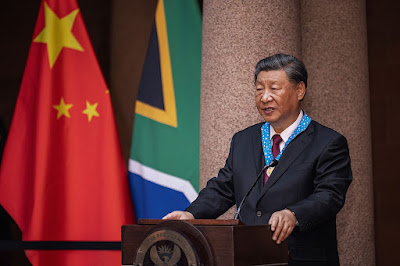New 'Made in' China Map: Xi Jinping's Caper Way and the World's Time Bomb
New 'Made in' China Map: Xi Jinping's Caper Way and the World's Time Bomb
China again made a number of neighboring countries furious after releasing a new map standard last week.
The map depicts the Bamboo Curtain country's territorial area with intersecting borders and even includes areas that are disputed with other countries, which has angered India, Malaysia, the Philippines and even Taiwan.
In the map, China draws its borders to include the eastern Himalayan region of Arunachal Pradesh, which Beijing claims is part of southern Tibet.
Meanwhile, Aksai Chin is a highland in the Western Himalayas that is disputed by China and India. This territory is claimed by India but controlled by China
In addition, China's latest map also includes its unilateral claims in the South China Sea. The new map shows China's maritime borders extending to parts of Malaysia's exclusive economic zone (EEZ) near Sabah and Sarawak, Brunei, the Philippines and Vietnam.
This new map immediately sparked strong protests from India, Malaysia and the Philippines. Meanwhile, Indonesia has also asked Beijing for an explanation regarding this map even though it has so far claimed that it has no maritime disputes with China in the South China Sea.
Because, this new map also depicts China's border which increasingly intersects with Indonesia's EEZ in Natuna.
Political analyst from the University of Tasmania, Professor James Chin, said the release of this new map was carried out ahead of two prestigious international forums, namely the ASEAN Summit (Summit) in Jakarta on 5-7 September and the G20 Summit in India on 9-10 September.
INFOGRAPHIC: New 'Made in China' Map That Makes India 'Angry'
According to Chin, this map was released to strengthen China's legitimacy over its unilateral claims to these disputed areas, no matter whether the international community and international arbitration court rejected this claim.
"Very important momentum. China wants this to be a topic of discussion at the summit and wants to show that they (Beijing) are consistent in claiming these territories as their own," said Chin.
"This is typical Chinese diplomacy," he added.
Before releasing this map, China had also released a map that changed the names of 11 places in the Indian state of Arunachal Pradesh to "Zangnan", or southern Tibet in Mandarin.
Recently, China has also become increasingly active in holding military exercises, sending fishing boats to patrol, and intercepting foreign ships and planes traveling to and fro in the South China Sea.
"With a number of important regional meetings about to take place, China appears to want to put pressure once again on summit participants by again raising its territorial claims," said Director of the International and Security Affairs Program at The Australian Institute, Allan Behm.
"This (China's) claim does not help negotiations regarding claims (territorial disputes). This (China's) assertion also does not make it difficult to negotiate current disputes and differences of opinion regarding dispute resolution. This is all just to make them (China) always remember (pay attention) ," he added as quoted by Channel News Asia.
The Indonesia Ocean Justice Initiative (IOJI) also believes that China's new map is not a new item used by President Xi Jinping's government to maintain its territorial claims. Senior Advisor at IOJI, Andreas Aditya Salim, said that so far the maps issued by China have never complied with international standards, and do not even have clear coordinate points.
For example, Andreas said that China has several times released maps of its borders in the South China Sea, starting from the eleven dash line to now the nine dash line. So far, according to him, only the United States has tried to analyze China's maps and they all have different coordinate points.
"So, it's just a piece of art, it means nothing in international law or international relations. So yes, if I see it, there is no impact. This has no impact, maybe this is just timing or the Chinese government's international strategy to respond to the dynamics in Taiwan.




Komentar
Posting Komentar